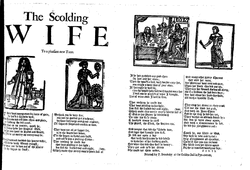 The scolding wife Date: 1670-1696 Tract Supplement / A2:4[78] The scolding wife Date: 1670-1696 Tract Supplement / A2:4[78] I won't say HOW exactly, but a scold's bridle features prominently in my third novel, Masque of a Murderer. (Well, okay, maybe one is found on the corpse of a young woman. Or not.) But the bridle does play an important role, and I thought I would give a little more background. Since at least the Middle Ages, women had been expected to heed Paul's admonition to be "chaste, silent and obedient," an expectation that became even more pronounced for women in early modern Europe. Women were branded "scolds" if they harangued their husbands or neighbors, or as we may say today, spoke their minds. "The Scolding Wife," shown here, is one of many tales of a merry young man who made the mistake of marrying a rich widow who very quickly made his life miserable. Indeed, the couple couldn't even sit down to eat without her scolding him: "They was not all at supper set, or at the board sat down, Such accounts explain how the men's good will and cheer are sapped by the woman's speech. It should be noted, however, that the tale is to be 'set to a pleasant tune.' The ballad is meant to be lighthearted--an everyday tale of a man who cannot control his wife. As such, it is as much a comment about his nature as it is about hers. Nevertheless, there is a gendered warning here about the respective roles that men and women should play in a marriage. My favorite of these little discourses is one by Anonymous (1684): "The tongue combatants, or A sharp dispute between a comical courageous country grasier, and a London bull-feather'd butchers twitling, twatling, turbulent, thundering, tempestuous, terrifying, taunting, troublesome, talkative tongu'd wife." Hmmmm..... 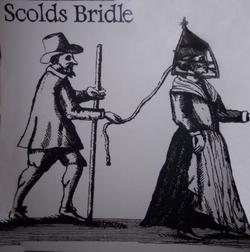 Sometimes, however, the warning against women's scolding was more explicit--and more terrifying. Devices known as scold's bridles, or scold's masks, first emerged in the Middle Ages, and continued to be used (in England at least) throughout the early modern era. The scold's mask was a painful contraption of iron and leather that fit over a woman's face that effectively prohibited her from speaking. Sometimes, the woman might be paraded about, as a humiliating reminder to keep her opinions to herself, and as a lesson to other women who might be inclined to do the same. So how does this play out in my novel? Find out in April 2015, when Masque of a Murderer is released!
3 Comments
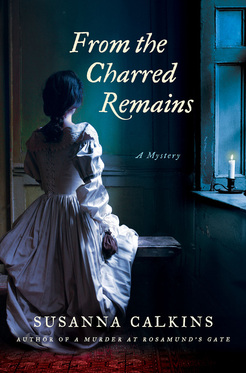 Recently, I have had a few questions from readers about one of the strange objects that Lucy had discovered on a corpse at the outset of From the Charred Remains. The item was a signet ring, one of several items found in a pouch on the body of a murdered man (check out what Lucy is holding on the cover). This ring, along with a hodgpodge of other eclectic items, will help identify the victim, as well as his killer. The signet ring I describe in the book was unusual because it swiveled to allow the wearer to display one of two different images. 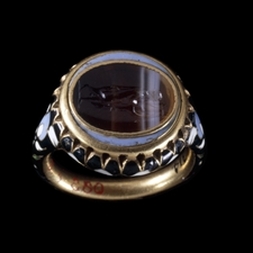 Image: British Museum Image: British Museum I was immediately intrigued by the concept. I had come across this interesting ring style when I was prowling about on the British Museum's website. The ring featured here is from the early 17th century, and was made in either France or Germany. When you really think about it, what would be the reason to have a ring with two faces? Boredom? Perhaps. Cost? Unlikely, since a swivel ring might be very expensive to create. Or perhaps, there is something about who you are that you wish at times to keep private, and other times, make public. It is not surprising that certain organizations, like the Freemasons, have used such rings since the early modern era. This particular ring was probably more ornamental than practical, but I liked the idea that there could be a secret hidden beneath its surface. 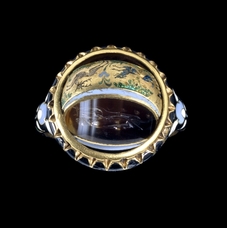 In this image, you can see how the ring swivels, from an onyx intaglio of the Greek god Apollo to a sardonyx intaglio of a male and female figure (the website suggests it is likely Bacchus and Ariadne). This ring is a little more elaborate than I was envisioning though. Not, perhaps, as simple as these more simple masonic rings (a style also found in the 17th century), but somewhere in between. Pretty cool, hey? Makes you wonder why the wearer might commission a ring like this...doesn't it?
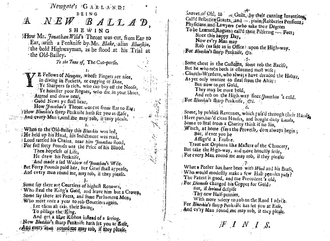 Anon., Newgate's garland (1724) (Wing C17:1[219b] Anon., Newgate's garland (1724) (Wing C17:1[219b] I started writing a post about murder ballads (which I've discussed on my blog before), to share specific examples about how crime was both a source of entertainment and news in early modern England. At random I selected a ballad to discuss, mainly for the gallows humor embedded in the title: "Newgate's Garland: Being a New Ballad shewing How Mr. Jonathon Wild's throat was cut, from ear to ear, with a penknife by Mr. Blake, alias Blueskin, the bold highwayman, as he stood at his trial at the Old Bailey."  the "newgate garland" may not be this festive the "newgate garland" may not be this festive A garland can refer to a miscellany, or a collection of literary works--so this ballad may have been one of several in a collection. But 'garland' also refers to a strand of material or wreath of flowers, usually hung in celebration. So I can only imagine there was a garland of sort that appeared when poor Mr. Wild's throat was slit "from ear to ear." Clearly there is a sense of celebration throughout this ballad, as the first stanza indicates: "Ye fellows of Newgate, whose fingers are nice, in diving in pockets, or cogging of dice, Ye Sharpers so rich, who can buy off the noose, Ye honester poor rogues, who die in your shoes, Attend and draw near, Good news ye shall hear, How Jonathan's throat was cut from ear to ear, How Blueskin's sharp penknife shall set you at ease, and every man round near me, may rob if they please." 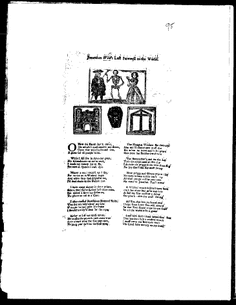 But why would slitting Mr. Wild's throat be a cause for celebration? I began to wonder who Mr. Wild was. So I looked for additional ballads and pamphlets that may explain why Blueskin, that noted highwayman, had sought to murder him. That's when I found another ballad, this one titled: "Jonathan Wild's final fairwell to the world." This would seem more promising. Yet I noticed right away that this ballad was dated in 1725, a full year after the other ballad. Moreover, this ballad described how Jonathan Wild was executed at Tyburn Tree, not murdered at all. Certainly, there was no mention of the throat-slashing incident. So a little MORE digging revealed a fascinating story... As it turns out, Mr. Jonathan Wild was quite famous. After being arrested for debt in 1710, he was thrown into prison. During this time, he began to play two sides of the justice system. In a highly corrupt prison system, Wild first began to do small tasks for the jailers, to a point where he was even trusted to leave the prison to run errands. After a short time, he became a "thief-taker," which was akin to a bounty-hunter in this period before the establishment of a systematic police force. Great Britain's Privy Council even consulted with him on the best way to reduce crime in the country. His answer, not surprisingly, was to raise the reward given to thief-takers from forty pounds per criminal, to a hundred pounds each. Yet, even as he publicly brought criminals to justice--by some accounts, he brought nearly fifty criminals to justice--he was also running a large criminal operation of his own. Wild did very well for himself for quite some time, but his luck turned sour when he was caught helping some of his men break out of prison. Brought to trial, he was mocked roundly by thieves. It was at this point that Blueskin took that near-fatal swipe at him. That part of the ballad makes a little more sense now: "When to the Old-Bailey this Blueskin was led, He held up his Head, his indictment was read, For full forty pounds was the price of his blood. Then hopeless of life, He drew his Penknife, And made a sad widow of Jonathan's wife, But forty pounds paid her, her grief shall appease, and every man round me, may rob if they please. 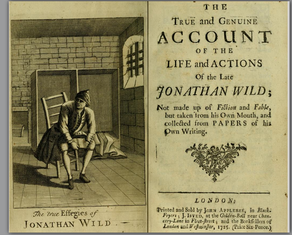 Wild was in jail for some time, until he was finally brought to the Tyburn Tree for hanging. People were so eager to see him executed that they waited for hours before he arrived. Along the way, Wild was subject to great physical and mental abuse, even having rotting animals and feces thrown upon him as he was carted towards his hanging. He seems to have been dazed and disoriented by the time he emerged from the cart. After he died, apparently his body was stolen, illegally dissected by surgeons, and ended up on display at the Hunterian Museum in London. Already famous before his death, Jonathan Wild became further immortalized when Daniel Defoe wrote about his exploits and sojourn into organized crime. Later, the novelist Henry Fielding--who as a young man was among the spectators of Wild's execution--parodied the man's life and death in the fictionalized History of the Life of the Late Mr. Jonathon Wild the Great (1745). (Check out, too, historian Peter Ackroyd's wonderful discussion of this parody). Who knew that this murder ballad--which actually turned out to be an attempted murder--would have an incredible back story! 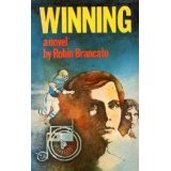 From time to time, I've thought to myself I'd like to find more sports-related books for my children. Today I opened a care package from my mother. Inside, were the usual niceties she likes to send: activity books for the kids, some little notepads and stickers, some coupons and...a book. The book was called Winning. A Novel by Robin Brancato. This book looked familiar to me. I thought, 'Oh, my parents must have found one of my old books up in the attic, and decided to include it in the care package.' Well, yes and no. It was one of my old books. Inside, was the elaborate scrawl that I used to sign my books with, along with the date I had acquired it. April 9, 1988. In the corner someone had penciled $3.00, so it was clearly bought second-hand from my local Wynnefield Library book sale (remember, the most beautiful library in the world). I don't know why I had picked it up as a teenager, actually, since I never really liked sports-themed books. As it turned out, though, Winning is the story of a young football player whose life is turned upside down by tragedy, so not a typical sports story at all. Although I only read this one once, it was an extremely compelling read. But when I left home to go to graduate school in 1993, I remember giving away a bunch of my old books to a local Goodwill, a few towns away from my parent's house in Philadelphia. Winning was one of those books. In the note I received today, my mother wrote: "We found this book in the Overbrook Train Station Book Swap." The Overbrook train station is just a few blocks from my parent's home in Philadelphia. So, almost exactly TWENTY YEARS LATER, the book returned to my parents, and they returned it to me. Where has the book been for twenty years? I'll never know. I do know I will save it for my children to read--I don't think they would have ever read this amazing story otherwise. But maybe this is just a reminder that sometimes when you throw a question to the universe, you never know how you'll be answered...and perhaps that's the fun of it. What do you think? Have you ever tossed a question to the universe and seen it answered in strange ways? |
Susanna CalkinsHistorian. Mystery writer. Researcher. Teacher. Occasional blogger. Categories
All
Archives
May 2023
|
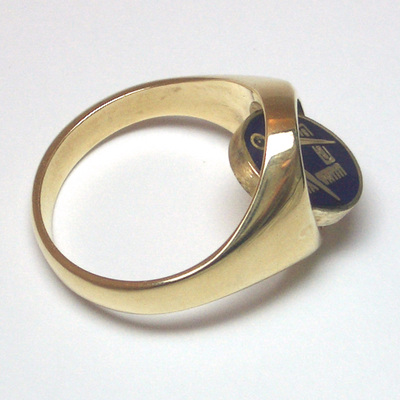
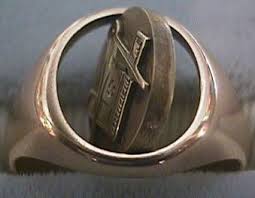
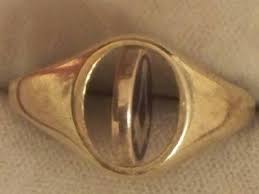
 RSS Feed
RSS Feed